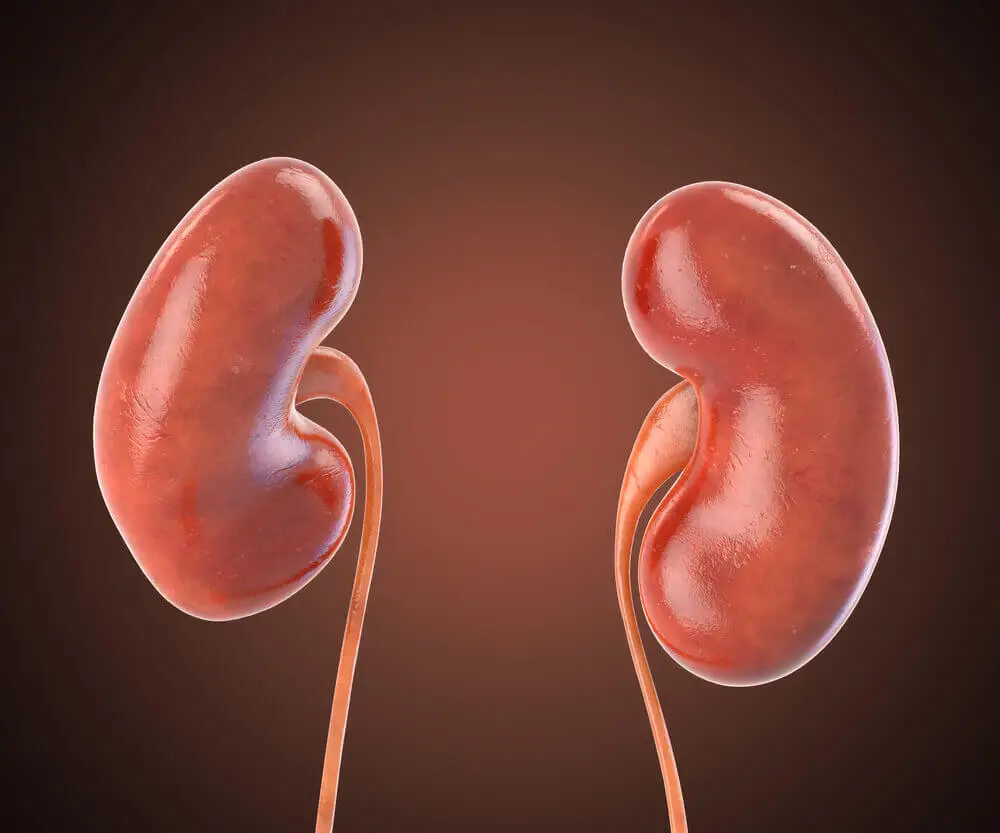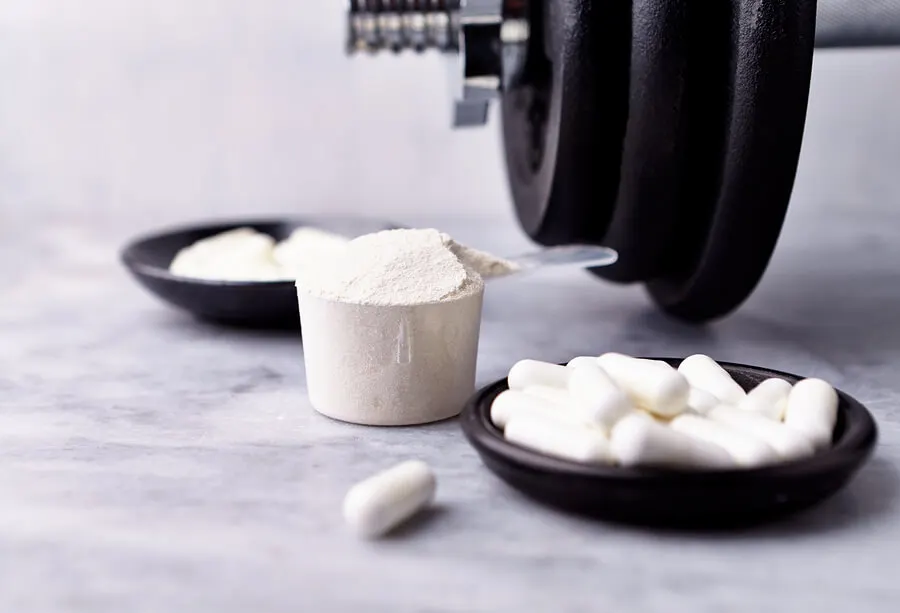Does the Creatine in Protein Shakes Cause Kidney Damage?


Written and verified by the doctor Leonardo Biolatto
Exercise supplementation is here to stay. Today, even amateur athletes who are strength training without taking part in competitions are consuming protein shakes. For this reason, it’s important to ask if creatine in protein shakes causes kidney damage.
Creatine is a common component of exercise supplementation. Since the 1990s it has been accepted as a legal substance that doesn’t alter the doping measurements of professional athletes. It can be found in fitness markets and even in specialized stores labeled as health food stores.
The metabolism of creatine ends in a compound called creatinine which is the one people have pointed out as a possible risk factor for kidney damage. In fact, the evaluations of the functions of the kidneys use this last parameter, among others, to determine if there is insufficiency or failure.
What is creatine?
Creatine has been linked to renal damage and has aroused suspicions in its long-term use due to its metabolism. As we have already mentioned, the final way to expel it from the body is the conversion to creatinine.
The human body naturally has creatine reserves. It obtains it by hepatic mechanisms that synthesize this organic acid, or through our diets, especially when adequate amounts of red meat are ingested. The basic amino acids that the liver can also use for its production are stored in this product.
The organs and tissues responsible for storing creatine are the muscles, to a greater extent. It’s also found in the kidneys and liver. Less creatine is found in the male reproductive system and in the brain.
To eliminate the surplus, the body transforms part of the creatine into creatinine and does so without enzymes, which will serve to analyze possible renal damage. It is the glomeruli of the kidneys that filter it and expel it into the urine.
This non-enzymatic transformation already tells us that the creatinine that comes from creatine won’t indicate a kidney problem in laboratory tests. It only establishes the total amount of the compound. In fact, the high creatinine levels that a physician may perceive in an athlete won’t always refer to the kidney if the person takes protein supplements. It may be an isolated value and nothing more.

Creatine supplements
Creatine in protein shakes, and as a sports supplement, has gained ground and is one of the most popular substances for strength athletes. Scientific studies have determined that creatine levels stored in the muscle can limit performance. Therefore, adding the substance artificially would improve the final results.
This limiting factor in the amount of creatine is the production of energy. When performing strength exercises, at a certain point creatine reserves are depleted and the muscle stops producing molecules that are fuels, such as ATP. Without ATP there is no muscle contraction.
Creatine consumed in supplement form allows for new ATP synthesis after ATP has been naturally depleted. This is particularly noticeable in short, high-intensity workouts. In conclusion, it translates into the ability to perform more repetitions without feeling fatigue.
As strength athletes tend to consume high-protein diets and supplement with creatine, the hypothesis of renal damage arose. Would protein overload be so potent as to make the kidneys fail? Is the urinary system capable of filtering so much protein without damaging its glomeruli?
Don’t miss this article: Are Sports Supplements Recommended for Teens?
Does creatine in protein shakes cause kidney damage in healthy people?
To analyze the evidence on creatine and kidney damage we have to consider two different situations: healthy people, without previous pathologies, and patients with some condition(s) prior to exercise. First, we will see what happens if a healthy athlete consumes this supplement frequently.
According to research published in the Journal of the International Society of Sports Nutrition, there’s no reason to assume renal damage is associated with the use of creatine in healthy people. The study carried out by these researchers evaluated two groups – one taking creatine and the other with a placebo. After 3 months, no significant changes in their kidney health parameters were observed.
Even with the addition of consuming a high-protein diet, i.e. more than 1.2 grams of protein per kilogram of body weight per day, no kidney damage was observed. This means that combining a high-protein diet with creatine supplementation will not be harmful for strength athletes who don’t suffer from any medical conditions.
Take a look at this great article: Common Sports Nutrition Myths
Does creatine cause more renal damage in patients with medical conditions?
The effect of creatine in protein shakes and other formats of supplementation in renal patients is debated, especially in the long term. Although there are well-conducted studies that have analyzed the consequences of the substance and established its safety in people with type 2 diabetes, for example, caution should still be exercised.
There have been reports of cases of people whose renal function was altered after consuming creatine. These reports should be taken as isolated events. They aren’t scientific studies maintained over time.
And, in any case, they are minority cases. The particular situation of one patient doesn’t mean that others will experience the same. Even so, the establishment of a safe framework for the prescription of creatine in renal patients is still far from being achieved.
As the principle backbone of medicine is to do no harm, it’s worth taking into consideration the proposal published in the Revista Médica de Chile:
Don’t use creatine supplements in patients with chronic renal disease or those who are taking nephrotoxic drugs.

No risk, but take advice
The use of creatine supplements for high-intensity exercise is not associated with kidney damage. That is what the available studies reveal.
However, it’s advisable to exercise caution and not to recommend the substance artificially to kidney patients. Nor for those who are taking any medication capable of generating toxicity in the kidneys.
Although these supplements can be obtained easily today, it’s preferable to consult with nutrition professionals to determine the appropriate doses. It isn’t the same to combine creatine with a high-protein diet as it is to consume it with a vegan diet, for example. Qualified advice will make a difference in safety.
All cited sources were thoroughly reviewed by our team to ensure their quality, reliability, currency, and validity. The bibliography of this article was considered reliable and of academic or scientific accuracy.
- Carvalho, Ana Paula Perillo Ferreira, Guilherme Eckhardt Molina, and Keila Elizabeth Fontana. “Creatine supplementation associated with resistance training does not alter renal and hepatic functions.” Revista Brasileira de Medicina do Esporte 17 (2011): 237-241.
- Brioschi, Fernanda Rodrigues, Hemily Marquezine Hemerly, and Érica Sartório Bindaco. “Efeitos ergogênicos da creatina.” Conhecimento em Destaque 8.19 (2020).
- Lugaresi, R., Leme, M., de Salles Painelli, V. et al. Does long-term creatine supplementation impair kidney function in resistance-trained individuals consuming a high-protein diet?. J Int Soc Sports Nutr 10, 26 (2013). https://doi.org/10.1186/1550-2783-10-26
- Gualano, Bruno & Ugrinowitsch, Carlos & Novaes, Rafael & Artioli, Guilherme & Shimizu, Maria & Seguro, Antonio & Harris, Roger & Lancha Jr, Antonio. (2008). Effects of creatine supplementation on renal function: A randomized, double-blind, placebo-controlled clinical trial. European journal of applied physiology. 103. 33-40. 10.1007/s00421-007-0669-3.
- Gualano, Bruno & Painelli, Vitor & Roschel, Hamilton & Lugaresi, Rebeca & Dorea, Egidio & Artioli, Guilherme & Lima, Fernanda & Silva, Maria & Cunha, Maria & Seguro, Antonio & Shimizu, Maria & Otaduy, Maria & Sapienza, Marcelo & Leite, Claudia & Bonfa, Eloisa & Lancha Jr, Antonio. (2010). Creatine supplementation does not impair kidney function in type 2 diabetic patients: A randomized, double-blind, placebo-controlled, clinical trial. European journal of applied physiology. 111. 749-56. 10.1007/s00421-010-1676-3.
- Greenhaff, Paul. “Renal dysfunction accompanying oral creatine supplements.” The Lancet 352.9123 (1998): 233.
- Vega J, Huidobro E JP. Efectos en la función renal de la suplementación de creatina con fines deportivos [Effects of creatine supplementation on renal function]. Rev Med Chil. 2019 May;147(5):628-633. Spanish. doi: 10.4067/S0034-98872019000500628. PMID: 31859895.
This text is provided for informational purposes only and does not replace consultation with a professional. If in doubt, consult your specialist.








